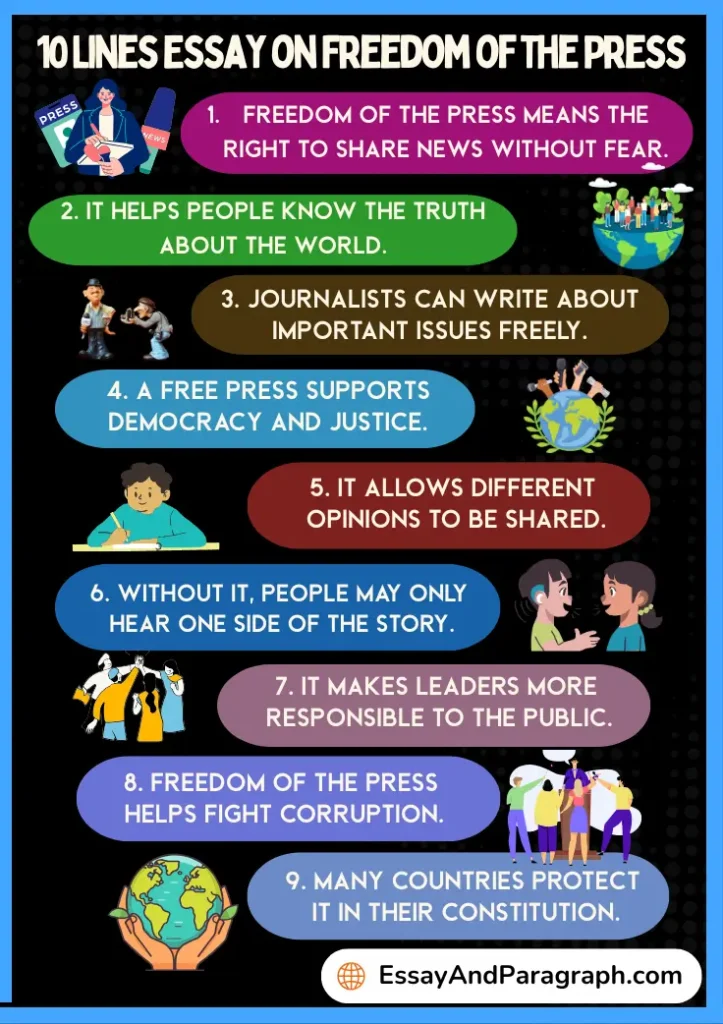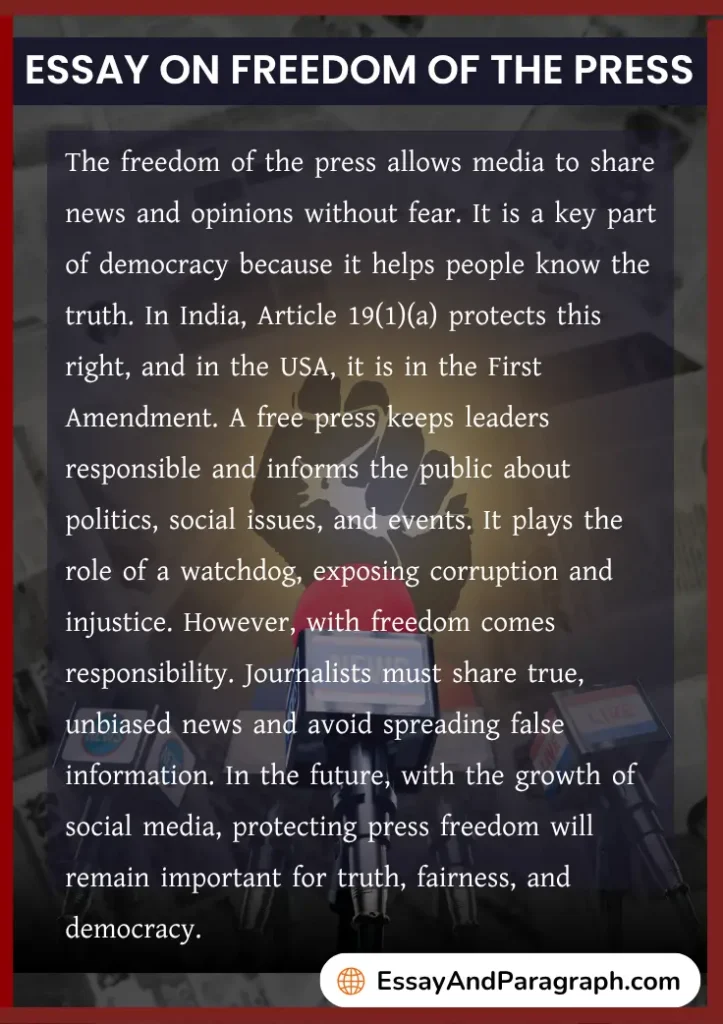Ever wondered why newspapers, TV, and online news can talk about big events freely? That is because of the freedom of the press. It allows journalists to share facts and opinions without fear.
The freedom of the press is an important part of democracy. It helps people know the truth about their leaders, their country, and the world. It makes sure everyone can stay informed and make better decisions.
I have read many real stories about how free press has changed history. From sharing important news to exposing corruption, its role is huge.
In this article, we will learn how to write an essay on freedom of the press in simple words. We will explore its meaning, importance, and examples in easy formats for students.
10 Lines Essay on Freedom of the Press in English
Freedom of the press means the right to share news without fear.
It helps people know the truth about the world.
Journalists can write about important issues freely.
A free press supports democracy and justice.
It allows different opinions to be shared.
Without it, people may only hear one side of the story.
It makes leaders more responsible to the public.
Freedom of the press helps fight corruption.
Many countries protect it in their constitution.
It is important for a fair and informed society.
 Essay on Freedom of the Press
Essay on Freedom of the Press
Essay on Freedom of the Press – 100 Words
The freedom of the press is the right of newspapers, TV, and online media to share information freely. It helps people understand the truth about politics, society, and the world. In countries like the USA and India, the constitution protects this right. When the press is free, it can speak against unfair actions. It also informs citizens about important events. Without freedom of the press, people may not know the full truth. This freedom keeps democracy strong and helps protect the rights of all people.
Essay on Freedom of the Press – 150 Words
The freedom of the press means that newspapers, TV, and online media can share news freely. It helps people know the truth about the world. In a democracy, this freedom is very important. It allows journalists to write about important events without fear.
In countries like India, Article 19(1)(a) of the Constitution protects this right. In the USA, it is in the First Amendment. A free press keeps the government responsible and helps fight corruption.
This freedom must also be used carefully. News should be true and fair. Spreading false information can harm society.
The freedom of the press makes sure everyone can hear different opinions and facts. It helps people make good decisions and keeps democracy strong. Protecting this freedom is important for the future of any free country.
Essay on Freedom of the Press – 200 Words
The freedom of the press is an important right in every democracy. It means that journalists can share facts and opinions without fear of punishment. In countries like the United States, this right is protected by the First Amendment. In India, Article 19(1)(a) ensures freedom of speech and expression, which also includes press freedom.
A free press keeps people informed about government decisions, social issues, and world events. It can expose corruption, highlight problems, and share success stories. Without a free press, the truth could be hidden from the public.
However, freedom of the press also comes with responsibility. Journalists must report honestly and avoid spreading false news. A balance between freedom and truth is important.
In the future, as technology grows, protecting press freedom will be even more important. It ensures people have access to fair, accurate, and timely information.
Short Essay on Freedom of the Press – 250 Words
The freedom of the press is a powerful tool in any free society. It allows newspapers, television, radio, and online platforms to share news without government control. This right is a pillar of democracy, helping citizens stay informed about important issues.
Countries like the USA and India protect this freedom through their constitutions. For example, India’s population of over 1.4 billion relies on newspapers, TV channels, and online media to get updates daily. A free press ensures that every citizen, from big cities to small villages, can access the truth.
The press acts as a watchdog. It checks the actions of leaders, businesses, and organizations. It helps uncover corruption, injustice, and wrongdoing. This transparency makes governments more accountable to the people.
However, freedom of the press must be used wisely. Spreading fake news or biased information can harm society. Journalists have a duty to provide accurate and balanced reports.
Looking ahead, press freedom will face new challenges from technology and social media. But its role will remain essential in protecting truth, fairness, and democracy.
Long Essay on Freedom of the Press – 500 Words
The freedom of the press is one of the strongest pillars of democracy. It means the media can share information without fear of censorship or punishment. This right helps people understand the truth about events in their country and the world.
In countries like the United States, freedom of the press is protected by the First Amendment. In India, Article 19(1)(a) ensures the right to freedom of speech, which covers press freedom. These laws protect journalists and allow them to report freely.
The press plays a vital role in society. It informs people about politics, education, health, the economy, and the environment. It brings important news to people living in cities, towns, and even remote villages. In India, where the population is over 1.4 billion and the area is about 3.28 million square kilometers, press freedom ensures that people across such a vast country can stay informed.
One of the most important roles of a free press is to act as a watchdog. It can expose corruption, highlight social issues, and hold powerful people accountable. For example, historical cases of investigative journalism have led to big changes in policies and laws.
However, freedom of the press also brings responsibility. Media outlets must ensure that their reports are factual and unbiased. Spreading misinformation or false claims can damage trust.
In the future, the growth of social media and digital platforms will create both opportunities and challenges for press freedom. But protecting this right will always be essential for a fair, informed, and democratic society.
FAQs on Freedom of the Press
1. What is meant by freedom of the press?
Freedom of the press means that newspapers, television, radio, and online news platforms can share information without fear of censorship or punishment. It allows journalists to write freely about government, society, and world events. This right helps people get true and accurate information.
2. Why is freedom of the press important in democracy?
In a democracy, citizens need to know the truth to make good decisions. Freedom of the press ensures that information is available to everyone. It also keeps leaders accountable because they know their actions can be reported to the public.
3. How is freedom of the press protected in India?
In India, freedom of the press comes from Article 19(1)(a) of the Constitution. This guarantees freedom of speech and expression. It means journalists can report on important issues without fear, as long as they follow the law.
4. What are the responsibilities of the press?
While the press has the freedom to report, it must also be responsible. This means sharing only correct and verified news, avoiding false stories, and respecting the privacy and rights of people. Responsible journalism builds trust with the audience.
5. What challenges does freedom of the press face today?
Today, press freedom faces challenges like fake news, government pressure, and threats to journalists. In some countries, media is restricted. In the future, protecting press freedom will be important to keep democracy strong and ensure truth reaches everyone.
Top 5 Quotes on Freedom of the Press
“Freedom of the press is the foundation of democracy.” – Thomas Jefferson
“The liberty of the press is essential to the security of freedom.” – John Adams
“A free press is the guardian of the people.” – Unknown
“Without a free press, there can be no free society.” – Benjamin Franklin
“The press is the watchdog of democracy.” – Walter Lippmann
 Essay on Freedom of the Press
Essay on Freedom of the Press
Summary of Freedom of the Press
The freedom of the press allows media to share news and opinions without fear. It is a key part of democracy because it helps people know the truth. In India, Article 19(1)(a) protects this right, and in the USA, it is in the First Amendment. A free press keeps leaders responsible and informs the public about politics, social issues, and events. It plays the role of a watchdog, exposing corruption and injustice. However, with freedom comes responsibility. Journalists must share true, unbiased news and avoid spreading false information. In the future, with the growth of social media, protecting press freedom will remain important for truth, fairness, and democracy.

